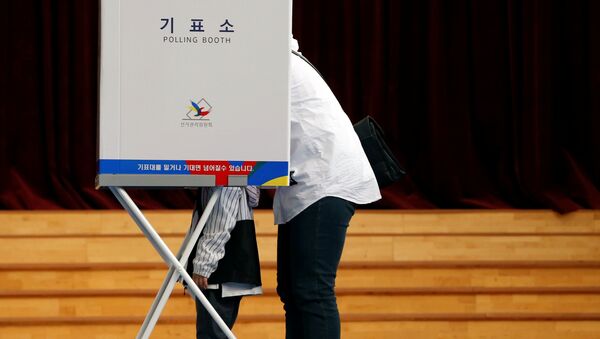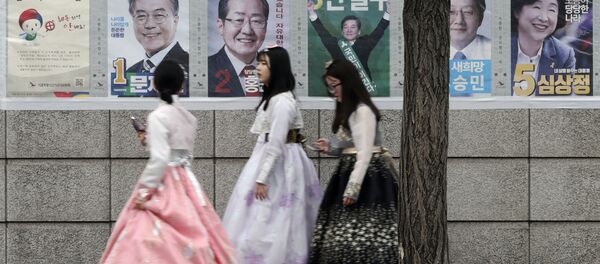MOSCOW (Sputnik) — The vote took place earlier Tuesday, less than two months after President Park Geun-hye was ousted following a corruption scandal that also led to her arrest.
Moon will come into power as soon as the Central Electoral Commission confirms the exit polls' results on Wednesday.
The exit polls, published after the polling stations’ closure, said Moon's closest rivals, Ahn Cheol-soo of the center-left People's Party and conservative Hong Joon-pyogained 21.8 and 23.3 percent of votes, respectively.
A total of 13,964 polling stations finished their work at 8 p.m. local time (11:00 GMT). In accordance with the state's legislation, South Korea also provided its citizens with the opportunity to vote ahead of the official election day, namely, on May 4-5.
The other 11 candidates are Hong Jun-pyo (former ruling center-right Liberty Korea Party), Yoo Seung-min (The Bareun Party), Sim Sang-jung (The Justice Party), Cho Won-jin Saenuri Party, Oh Young-guk (The Economic Patriot Party), Chang Sung-min (The Grand National Unity Party), Lee Jae-oh (The New Party 2018), Kim Sun-dong (a left-wing People's United Party), Lee Kyung-hee (The Korean People's Party), Yoon Hong-sik (The Hongik Party) and an Independent candidate Kim Min-chan. The two candidates that stepped out from the presidential race are Nam Jae-jun (The Patriotic Korea Party) and Kim Jung-son (The Future Korean Peninsula Union).
Under the national Constitution, the president of South Korea is elected by universal, equal, direct suffrage and by secret ballot.
The president serves only five years in office and cannot be reelected for another term.
Presidential elections are held 40-70 days before the incumbent president's tenure expires. In case of early elections, a new president must be elected over a period of 60 days.
Never miss a story again — sign up to our Telegram channel and we'll keep you up to speed!



